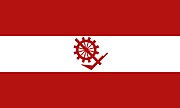Praja Socialist Party
 From Wikipedia - Reading time: 6 min
From Wikipedia - Reading time: 6 min
Praja Socialist Party | |
|---|---|
 | |
| Leader |
|
| Founded | September 1952 |
| Dissolved | 1972 |
| Merged into | Samyukta Socialist Party (Fraction) |
| Succeeded by | Socialist Party.[1] |
| Headquarters | 18, Windsor Place, New Delhi[2] |
| Ideology | Socialism |
| Political position | Left-wing[3] |
| International affiliation | Asian Socialist Conference |
| ECI Status | Dissolved |
| Party flag | |
 | |
The Praja Socialist Party, abbreviated as PSP, was an Indian political party.[4] It was founded in 1952 when the Socialist Party, led by Jayaprakash Narayan, Rambriksh Benipuri, Acharya Narendra Deva and Basawon Singh (Sinha), merged with the Kisan Mazdoor Praja Party led by J. B. Kripalani (former president of the Indian National Congress and a close associate of Jawaharlal Nehru).
The PSP led the cabinet under Pattom A. Thanu Pillai as chief minister of State of Travancore-Cochin from March 1954 to February 1955. In 1955 a faction led by Ram Manohar Lohia broke from the party, reusing the name "Socialist Party".[5] The PSP again came to power in the new state of Kerala under Pattom A. Thanu Pillai from February 1960 to September 1962. In 1960, Kripalani left the party and in 1964, Asoka Mehta joined Congress after his expulsion from the party.
Another section of the party, led by the trade union leader George Fernandes, broke off to join the Samyukta Socialist Party in 1967. In 1972, a section merged with Fernandes's party to become the Socialist Party once more, before becoming part of the Janata coalition in 1977 following the proclamation of Emergency by Indira Gandhi.[5]
Formation
[edit]In September 1952, the Kisan Mazdoor Praja Party merged with the Socialist Party with J. B. Kriplani as the chairman and Asoka Mehta as the general secretary.[6]
Elections
[edit]At the party's first general election in 1957, the PSP won 10.41% of the total votes and 19 seats in the Lok Sabha.[7] However, the party's vote share continued to decline over the next few elections. It won 6.81% of the total votes and 12 seats in the Lok Sabha in 1962,[8] 3.06% of the total votes and 13 seats in the Lok Sabha in 1967[9] and only 1.04% of the total votes and only 2 seats in the Lok Sabha in 1971.[6][10]
See also
[edit]References
[edit]- ^ Verinder Grover (1997). Political Parties and Party System. Deep & Deep Publications. pp. 228–231. ISBN 978-81-7100-878-0.
- ^ Braunthal, Julius (ed). Yearbook of the International Socialist Labour Movement. Vol. II. London: Lincolns-Prager International Yearbook Pub. Co, 1960. p. 38
- ^ Singh, Mahendra Prasad (1981). Split in a Predominant Party: The Indian National Congress in 1969. Abhinav publications. p. 69. ISBN 9788170171409. Retrieved 18 July 2024.
The support for the decision was more solid among the left-wing parties; in addition to the Communist Party of India(CPI), Communist Party of India-Marxist(CPI-M), Samyukta Socialist Party(SSP), and Praja Socialist Party(PSP)...
- ^ Lewis P. Fickett Jr. (September 1973). "The Praja Socialist Party of India—1952–1972: A Final Assessment". Asian Survey. 13 (9): 826–832. doi:10.2307/2642762. JSTOR 2642762.
- ^ a b "Glossary of Organisations: So". Marxists Internet Archive. Retrieved 26 May 2024.
- ^ a b Chandra, Bipan & others (2000). India after Independence 1947–2000, Neu Delhi:Penguin Books, ISBN 0-14-027825-7, pp. 201–2
- ^ "Statistical Report on General Elections, 1957 to the Second Lok Sabha, Volume I" (PDF). Election Commission of India website. p. 37. Retrieved 10 March 2010.
- ^ "Statistical Report on General Elections, 1962 to the Third Lok Sabha, Volume I" (PDF). Election Commission of India website. p. 56. Retrieved 10 March 2010.
- ^ "Statistical Report on General Elections, 1967 to the Fourth Lok Sabha, Volume I" (PDF). Election Commission of India website. p. 75. Retrieved 10 March 2010.
- ^ "Statistical Report on General Elections, 1971 to the Fifth Lok Sabha, Volume I" (PDF). Election Commission of India website. p. 76. Retrieved 10 March 2010.
 KSF
KSF